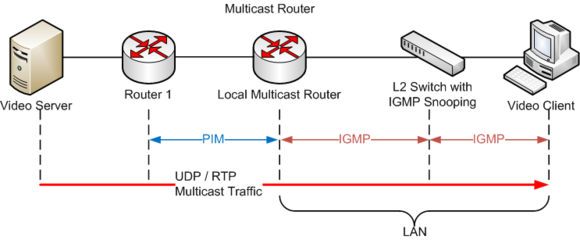The Power of Multicast Communication
☰ Section: Network | ⚀ Posted: 2025-04-29 02:27:04 | ⚀ Updated: 2025-04-29 02:27:04 DALL-E via ChatGPT - powered by OpenAI
DALL-E via ChatGPT - powered by OpenAI
A Deep Dive into the IGMP Protocol
In the world of computer networking, where information must be efficiently sent to multiple recipients, multicast communication takes center stage. At the heart of this seamless communication lies the Internet Group Management Protocol (IGMP). This article explores the intricacies of IGMP, shedding light on its functions, significance, and how it facilitates the efficient transmission of data to multiple hosts.
Multicast communication is a one-to-many or many-to-many communication paradigm where data is sent from one source to multiple destinations simultaneously. Unlike unicast (one-to-one) and broadcast (one-to-all) communication, multicast optimizes bandwidth usage by delivering data only to devices interested in receiving it.
Understanding Multicast Communication
 en.wikipedia.org
en.wikipedia.org
IGMP is the protocol that enables hosts to communicate their interest in joining or leaving multicast groups to neighboring routers. This communication is vital for routers to understand which hosts are part of specific multicast groups and efficiently forward multicast traffic only to those interested devices. The IGMP protocol is implemented on hosts and routers.
IGMP is only used on IPv4 networks. On IPv6 networks the multicast management is done by Multicast Listener Discovery (MLD) which is a part of ICMPv6. IGMP uses bare IP encapsulation.
How it works
A host on the network periodically sends out subscription queries. One single router per subnet does perform this querying function, but also some multilayer switches include an IGMP capability to allow their IGMP snooping features in order to work in the absence of an IGMP-capable router.
Protocol Versions
⚬ IGMPv1 The initial version of IGMP, it allowed hosts to report group memberships, but lacked the ability for routers to confirm group memberships actively.
⚬ IGMPv2Introduced explicit Leave messages, enabling hosts to explicitly notify routers when they wish to leave a multicast group.
⚬ IGMPv3The latest version, IGMPv3, adds support for source-specific multicast, allowing hosts to specify the sources from which they want to receive multicast traffic.
IGMP Key Concepts
Membership Reports:Hosts use IGMP Membership Reports to inform routers about their interest in receiving multicast traffic for specific groups. These reports are crucial for routers to maintain accurate membership information.
Query Messages:Routers periodically send IGMP Query messages to all hosts on the network. Hosts respond with Membership Reports, allowing routers to update their multicast group membership information.
Leave Messages:When a host is no longer interested in a particular multicast group, it sends an IGMP Leave message to the router. This helps routers update their membership tables accordingly.
Significance of IGMP in Network Efficiency
Bandwidth OptimizationIGMP ensures that multicast traffic is directed only to hosts interested in receiving it, preventing unnecessary flooding of the entire network and conserving bandwidth.
ScalabilityAs networks grow larger, the importance of efficient multicast communication becomes even more pronounced. IGMP facilitates the scaling of networks by managing multicast group memberships intelligently.
Security ConcernsAs with any protocol, IGMP is not immune to potential security vulnerabilities. Network administrators must be vigilant in implementing measures to secure IGMP communication.
IGMP Snooping IGMP Snooping is a feature commonly used in switches to intelligently manage multicast traffic, enhancing overall network efficiency and security.
Conclusion
In the realm of computer networking, where data dissemination is a critical aspect, the IGMP protocol emerges as a key enabler of efficient multicast communication. As networks continue to evolve, the role of IGMP in optimizing bandwidth, improving scalability, and enhancing overall network efficiency becomes increasingly prominent.
But: Understanding IGMP is paramount for network administrators seeking to harness the power of multicast communication in today's interconnected world. As we can see, while IGMP is a useful protocol, it can also be terribly misused.
Got some light into the dark? I hope this article could help a little bit.
Have lot of Fun ...
.m0rph
-----BEGIN GEEK CODE BLOCK----- GIT e+ d-- s++:++ a++ G++ C+++ M-- W+++ L++++>$ P+++ E--- W+++ N++ o+ PS+++ PE+++ Y++ PGP++ !DI t++ 5-- X++ R++ tv- b-(++) h+ r- y(++)- -----END GEEK CODE BLOCK-----